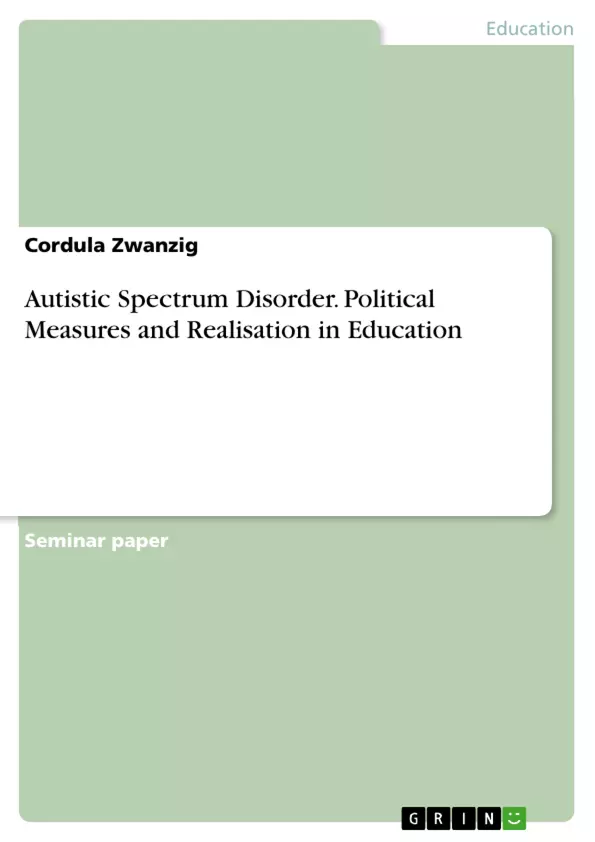Although research and politicians already equally well realised the importance of strongly involved parents one further step shall be taken in the near future. Therapies aim to be good enough to turn parents from co-therapists into the most reliable teacher for their kids for the rest of their lives.
Table of Contents
- Introduction - The Autistic Spectrum Disorder and its Symptoms
- Why Are They So Hard to Reach? - Other Possible Diagnoses
- Political Interventions - Do They Help to Reach the 'Hard-to-Reach'?
- Practical Methods, \"First Aid\", and Therapies
- Conclusion - With a New Perspective
Objectives and Key Themes
This report aims to understand why families with an autistic child may be hard to reach and to explore ways to better support these families. It examines current research and UK policies surrounding autism, assesses potential measures for support, and proposes a new direction for approaching this complex issue.
- The nature and symptoms of autistic spectrum disorder (ASD)
- The challenges of diagnosing ASD and differentiating it from other related diagnoses
- The impact of social and economic factors on the ability to reach families with autistic children
- The need for political and practical interventions to address the "hard-to-reach" population
- The importance of a new perspective and approach to supporting families with autistic children
Chapter Summaries
The introduction provides an overview of the autistic spectrum disorder (ASD) and its common symptoms. It highlights the difficulties autistic children face in social interaction, communication, and thinking. The chapter explores how ASD can be a lifelong disorder that can make it difficult for individuals to achieve independence.
The second chapter delves into the complexities of diagnosing ASD, examining related diagnoses such as Asperger's syndrome and Savant Syndrome. It discusses the challenges of distinguishing ASD from other disorders and the potential for misdiagnosis due to factors such as the lack of a strong father figure in early childhood. The chapter emphasizes the importance of early diagnosis and the devastating consequences of missed or delayed diagnoses.
The report then delves into the challenges of reaching families with autistic children, focusing on the impact of social, economic, and cultural factors. It highlights the need for connected networks to support parents and the importance of addressing the stigma surrounding seeking help for mental health disorders. The chapter emphasizes the need for better access to professional support and the urgency of tackling the lack of mental health professionals.
The report concludes with a call for a new perspective on supporting families with autistic children, emphasizing the need for comprehensive and accessible services. It acknowledges the complexities of the issue and suggests that a multi-faceted approach is necessary to ensure the well-being of autistic individuals and their families.
Keywords
This report focuses on autistic spectrum disorder (ASD), its diagnosis and related diagnoses such as Asperger's Syndrome and Savant Syndrome. Key concepts explored include social interaction, communication, and thinking difficulties in ASD. The report emphasizes the importance of support for families with autistic children and the need for political and practical interventions to address the "hard-to-reach" population. The report also highlights the impact of social and economic factors on access to services and the stigma surrounding seeking help for mental health disorders.
Frequently Asked Questions
What are the main symptoms of Autistic Spectrum Disorder (ASD)?
ASD is characterized by difficulties in social interaction, communication, and repetitive patterns of thought or behavior.
What is the difference between ASD and Asperger's Syndrome?
The report discusses Asperger's as a related diagnosis, often characterized by average or above-average intelligence and fewer language delays than classic autism.
Why are some families with autistic children considered "hard-to-reach"?
Social, economic, and cultural factors, along with the stigma surrounding mental health, can prevent families from accessing professional support.
What is the role of parents in autism therapy?
Modern therapies aim to empower parents, moving them from "co-therapists" to becoming the most reliable teachers for their children throughout their lives.
Are there specific political measures in the UK for ASD?
The report examines UK policies aimed at improving diagnosis and support networks for families, though it highlights the ongoing lack of mental health professionals.
- Citar trabajo
- Cordula Zwanzig (Autor), 2013, Autistic Spectrum Disorder. Political Measures and Realisation in Education, Múnich, GRIN Verlag, https://www.grin.com/document/267840



